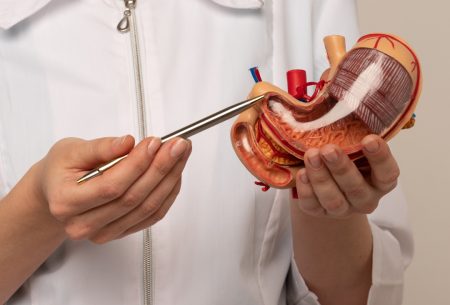What does bowel strictures and adhesions mean?
Your gut is essentially a single, long, winding tube from your mouth to your bottom. The food that you eat goes through stages of ingestion, digestion, and absorption, before any waste products are passed back out. However, in some cases there can be barriers to the movement of food through the gut, this includes bowel strictures and adhesions.
A stricture is a narrowing of the gut, it can be caused by various factors, such as:
- Scar tissue from previous gut surgery (fibrosis)
- Inflammation in the gut
- Or as a complication of cancer treatments or radiation therapy
An adhesion is a band of scar tissue that may cause tissues or organs inside your body to stick together.
Strictures and adhesions can make it difficult for food to pass through, and you may experience gut symptoms such as discomfort, pain, bloating, nausea and vomiting.
Dietary changes
You may need to make changes to your diet, to help manage your symptoms and reduce the risk of a blockage.
There really is no one size fits all approach, and your dietitian will give advice having considered:
- Where in the gut it your stricture or adhesion is
- How severe it is (i.e is it causing a partial or complete blockage)
- If you are having any treatment for this
- Your presenting symptoms
- Nutritional deficiencies or priorities
Low Fibre Diet
High fibre and high residue foods tend to be harder to digest, and therefore often need to be excluded from the diet whilst you have a stricture or adhesion. You may be asked to reduce your intake of harder to digest foods, such as:
- Certain fruits and vegetables (e.g. where you consume the skins, seeds and pips)
- Nuts and seeds
- Wholegrains
Some low fibre / easier to digest foods include:
- White flour breads, white rice, pastas, cereals such as oats, rice cereals and cornflakes
- Dairy products such as milk, cheese and yoghurts (avoiding dried fruit, granolas etc)
- Meat, chicken and fish (removing the visible fat, skins and gristle)
- Potatoes (all types without skins, including sweet potato, crisps, chips without skins)
- Vegetables (flesh only – no peel, seeds, or stalks. Examples include cauliflower, broccoli, parsnip, swede, carrot, turnip, marrow, pumpkin, courgette, cucumber, aubergine, beetroot, avocado)
- Sieved tomato sauces, including passata & tomatoes without skins or seeds e.g. tinned
- Well-cooked and smooth pureed beans, pulses, and lentils without skins
- Smooth hummus
- Strained vegetable juices and smooth pureed soups
- Fruits without skins seeds or pips (For example peaches, ripe bananas, pears, melon, lychee, nectarines, plums, papaya)
- Smooth fruit juice or smoothies
Constipation
Cutting out fibre from your diet may leave you feeling more constipated. If you are struggling to open your bowels regularly or feel you haven’t quite emptied properly, it is important that you let your dietitian or doctor know and they can advise you on what to do.
Nutritional Balance
You may need to take oral nutritional supplements to help you meet your energy, protein, or vitamin and mineral needs. This would be determined by your dietitian or doctor.
Will this affect my Gut Health?
Following a low fibre, or restricted diet for a short period of time won’t have a negative impact on your longer term gut health. Once you have had treatment your dietitian will talk you through gradually building back up to a normal diet, which will take into consideration all of your nutritional needs.
In some cases you may need to follow a restricted diet for a longer period of time. In this circumstance your dietitian will discuss options with you to optimise your gut health, without increasing the risk of symptoms or blockage.
This blog was authored by Tanzil Miah, an IBD and surgical specialist dietitian.
Need extra support?
If you are struggling to know what to eat with a gut stricture or adhesion, please speak with a specialist dietitian for personalised advice. You can ask your doctor or surgeon to refer you, or click here to book an appointment with our team.
_
References
- NASBO: Report of the National Audit of Small Bowel Obstruction, 2017 National Audit of Small Bowel Obstruction (NASBO) Protocol V10
- 2016 Association of Surgeons of Great Britain and Northern Ireland
- Royal College of Surgeons Commissioning guide: Emergency general surgery (acute abdominal pain)
- 2014 National Institute of Health and Clinical Excellence.
- Colorectal Cancer: The Diagnosis and Management of Colorectal Cancer Management of Local Disease Colonic Stents in Acute Bowel Obstruction
- Clinical Audit Tool Implementing NICE Guidance. Nice Clinical Guideline 131
- 2014 National Institute for Health and Clinical Excellence
- Colorectal Cancer Information for the public, 2011













